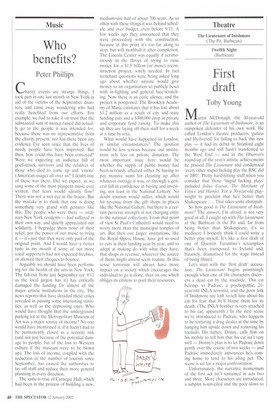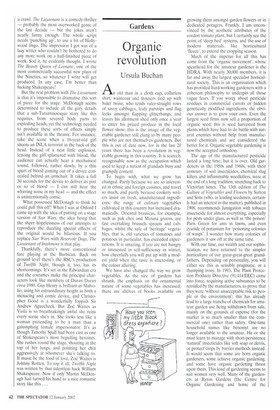The Lieutenant of Inishmore (The Pit, Barbican) Twelfth Night (Barbican)
First draft
Toby Young
Martin McDonagh, the 30-year-old author of The Lieutenant of Inishmore, is an outspoken defender of his own work. He called London's theatre producers 'gutless and lily-livered' for failing to back this new play — it had its debut in Stratford eight months ago and still hasn't transferred to the West End — and in the Observer's round-up of the year's artistic achievements he praised The Lieutenant and condemned 'every other stupid fucking play the RSC did in 2001'. Pretty hard-hitting stuff when you consider that those 'stupid fucking plays' included Julius Caesar, The Merchant of Venice and Hamlet. For a 30-year-old playwright to proclaim that he's better than Shakespeare . .. That takes some chutzpah.
So how good is The Lieutenant of lnishmore? The answer, I'm afraid, is not very good at all. I caught up with The Lieutenant at the Barbican in the Pit and, far from being better than Shakespeare, it's so mediocre I honestly think I could write a better play myself. It's like a first draft of one of Quentin Tarantino's screenplays that's been transposed to Ireland and, bizarrely, dramatised for the stage instead of being filmed.
Let's start with the 'first draft' accusation. The Lieutenant begins promisingly enough when one of the characters discovers a dead cat by the roadside. This cat belongs to Padraic, a psychopathic, 21year-old INLA terrorist, and the poor folk of Inishmore are loth to tell him about his cat for fear that he'll blame them for its death. (The INLA bomber is very attached to his cat, apparently.) In the next scene we're introduced to Padraic, who happens to be torturing a drug dealer at the time by hanging him upside down and removing his toenails. His father, Donny, calls him on his mobile to tell him that his cat isn't very well — Donny's plan is to let Padraic down gently over the course of two weeks — and Padraic immediately announces he's coming home to tend to his ailing pet. The scene is set for a major confrontation.
Unfortunately, the narrative momentum of the first act isn't sustained in acts two and three. More characters are introduced, a subplot is unveiled and the pace slows to a crawl. The Lieutenant is a comedy-thriller — probably the most overworked genre of the last decade — but the jokes aren't nearly funny enough. The whole script needs 'punching up', to use a bit of Hollywood lingo. The impression I got was of a lazy writer who couldn't be bothered to do any more work on a half-finished piece of work. Sod it, he evidently thought. I wrote The Beauty Queen of Leenane, one of the most commercially successful new plays of the Nineties, so whatever I write will get produced. In any case, I'm better than fucking Shakespeare!
But the real problem with The Lieutenant is that it's impossible to dramatise this sort of piece for the stage. McDonagh seems determined to include all the gory details that a sub-Tarantinoesque story like this requires, from severed body parts to exploding heads, yet the technology needed to produce these sorts of effects simply isn't available in the theatre. For instance, take the scene when a 16-year-old girl shoots an INLA terrorist in the back of the head. Instead of a neat little explosion, leaving the girl splattered with blood, the audience can actually hear a mechanical sound, followed, rather slowly, by a thin spurt of blood coming out of a device concealed behind an armchair. It takes a full 30 seconds for the device to deliver its pint or so of blood — I can still hear the whirring noise in my head — and the effect is unintentionally comic.
What possessed McDonagh to think he could pull this off? When I was at Oxford I came up with the idea of putting on a stage version of Star Wars, the idea being that the sheer hopelessness of our attempts to reproduce the dazzling special effects of the original would be hilarious. If you replace Star Wars with Reservoir Dogs, The Lieutenant of Inishmore is that play.
Thankfully, there's more conventional fare playing at the Barbican. Back on ground level there's the RSC's production of Twelfth Night, though it, too, has its shortcomings. It's set in the Edwardian era and the costumes make the principal characters look like members of Duran Duran circa 1980. Guy Henry is brilliant as Malvolio, using his extraordinary height as both a menacing and comic device, and Christopher Good is a wonderfully foppish Sir Andrew Aguecheek. But Zoe Waites as Viola is so breathtakingly awful she ruins every scene she's in. She looks less like a woman pretending to be a man than a galumphing female impersonator. It's as though Timothy Spall had been cast as one of Shakespeare's most beguiling heroines. She rushes round the stage, shouting at the top of her lungs, and pointing her chin aggressively at whomever she's talking to. If music be the food of love, Zoe Waites is Johnny Rotten. To top it all, Twelfth Night was written by that talentless hack William Shakespeare. Now if only Martin McDonagh had turned his hand to a nice romantic story like this .. .



























































 Previous page
Previous page